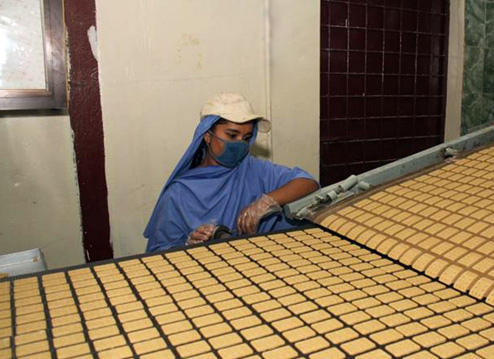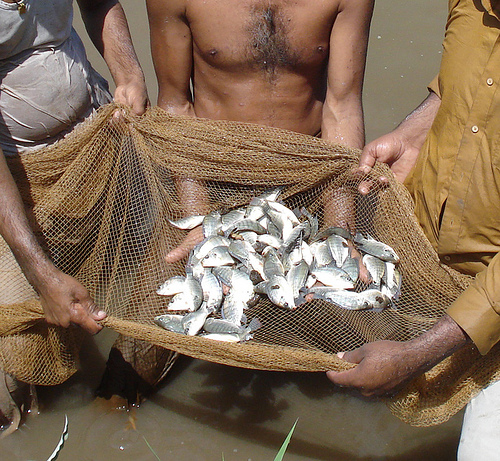
Family of three dines outdoors. ERS research found that among households that included an adult with a work-preventing disability, a third were food insecure in 2009-10.
This post is part of the Science Tuesday feature series on the USDA blog. Check back each week as we showcase stories and news from USDA’s rich science and research portfolio.
In 2011, close to 15 percent of U.S. households had trouble meeting their food needs. This phenomenon is known as food insecurity, and it means that at some time during the year, these households lacked adequate food for one or more household members due to insufficient money or other resources for food. Read more »
The President’s Council of Advisors on Science and Technology (PCAST) today presented a report on the importance of USDA’s leadership in agricultural research. The Council is a diverse group of individuals appointed by the President from across the basic and applied scientific community to advise the President and the Executive Office of the President on key scientific issues.
Report to the President on Agricultural Preparedness & the Agriculture Research Enterprise, by the Council, concludes that the United States is the undisputed world leader in agricultural production today, but also cautions that U.S. agriculture also faces a number of challenges that are poised to become much more serious in the years ahead.
There is no question that the report recognizes American agriculture and USDA’s leadership in agricultural science and research as critical to the efforts to ensure greater food security and a better future for everyone. Read more »
Last month, hundreds of people from around the world gathered in Des Moines, Iowa, to honor this year’s World Food Prize Laureate, Dr. Daniel Hillel, for his pioneering scientific work in micro-irrigation. His drip technology revolutionized the way farmers watered crops and increased food production in the arid regions of the Middle East and other parts of the world for the past five decades.
Dr. Hillel’s recognition inspired many in attendance including Dr. Rajashekhara Rao Korada, a senior scientist from India currently in the United States for the Foreign Agricultural Service’s (FAS) Norman E. Borlaug International Agricultural Science and Technology Fellowship Program, a program named in honor of the “Father of the Green Revolution.” During his 12-week fellowship at Louisiana State University, he’s studying pest management strategies for sweet potato crops. Read more »

A Bangladeshi factory worker monitors the production of biscuits made from U.S. donated wheat. The donation was delivered to the World Food Programme, a Foreign Agricultural Service (FAS) McGovern-Dole program participant that works to provide food assistance in more than 73 countries. The biscuits will be distributed to about 2,000 schools in the poorest areas of Bangladesh. (Photo courtesy U.S. Embassy New Dehli)
Approximately 350,000 school children in Bangladesh now have access to a daily snack after the U.S. government recently donated more than 10,000 metric tons of wheat to the country through the Foreign Agricultural Service’s (FAS) McGovern-Dole Food for Education Program. Read more »
Tags: Bangladesh, Dan W. Mozena, FAS, Feed the Future, Food Security, George McGovern, McGovern-Dole Food for Education Program, President Obama, Trade, World Food Prgoramme
 Food Security, International, Trade
Food Security, International, Trade

Workers hold a net full of tilapia at a fish farm in Pakistan. The fish are part of the American Soybean Association’s (ASA) World Initiative for Soy in Human Health (WISHH) program called “FEEDing Pakistan.” The Foreign Agricultural Service (FAS) helped fund the program, which aims to enhance the country’s growing aquaculture sector through trial fish feeding using high–protein, floating fish feed produced from U.S. soybean meal. (Courtesy World Initiative for Soy in Human Health)
An innovative Foreign Agricultural Service (FAS)-funded program in Pakistan is not only improving local diets, but is creating jobs, training workers and helping create a thriving aquaculture industry with U.S. soy. Read more »
As summer break winds down, children around the world prepare for a new school year. But for some children, going to school is more than making new friends and learning new subjects; it’s an opportunity to eat a full, nutritious meal.
The Foreign Agricultural Service’s (FAS) McGovern-Dole Food for Education Program helps provide these meals to children in low-income, food-deficit countries that are committed to universal education. The program aligns with President Obama’s Feed the Future initiative and has helped feed millions of children over the years. One example of the success of this program can be found in the Republic of Congo, where the undernourishment rate of children is estimated at nearly 35 percent of the population.
Since 2001, FAS has implemented four McGovern-Dole Programs in Congo through the non-profit organization, International Partnership for Human Development (IPHD). During this time, IPHD distributed about 30,000 metric tons of U.S.-donated foods (rice, beans, potato flakes and vegetable oil) to nearly 150,000 pre-school and primary school-age Congolese children. IPHD also supported school infrastructure, parent-teacher associations and children’s health needs. Read more »



